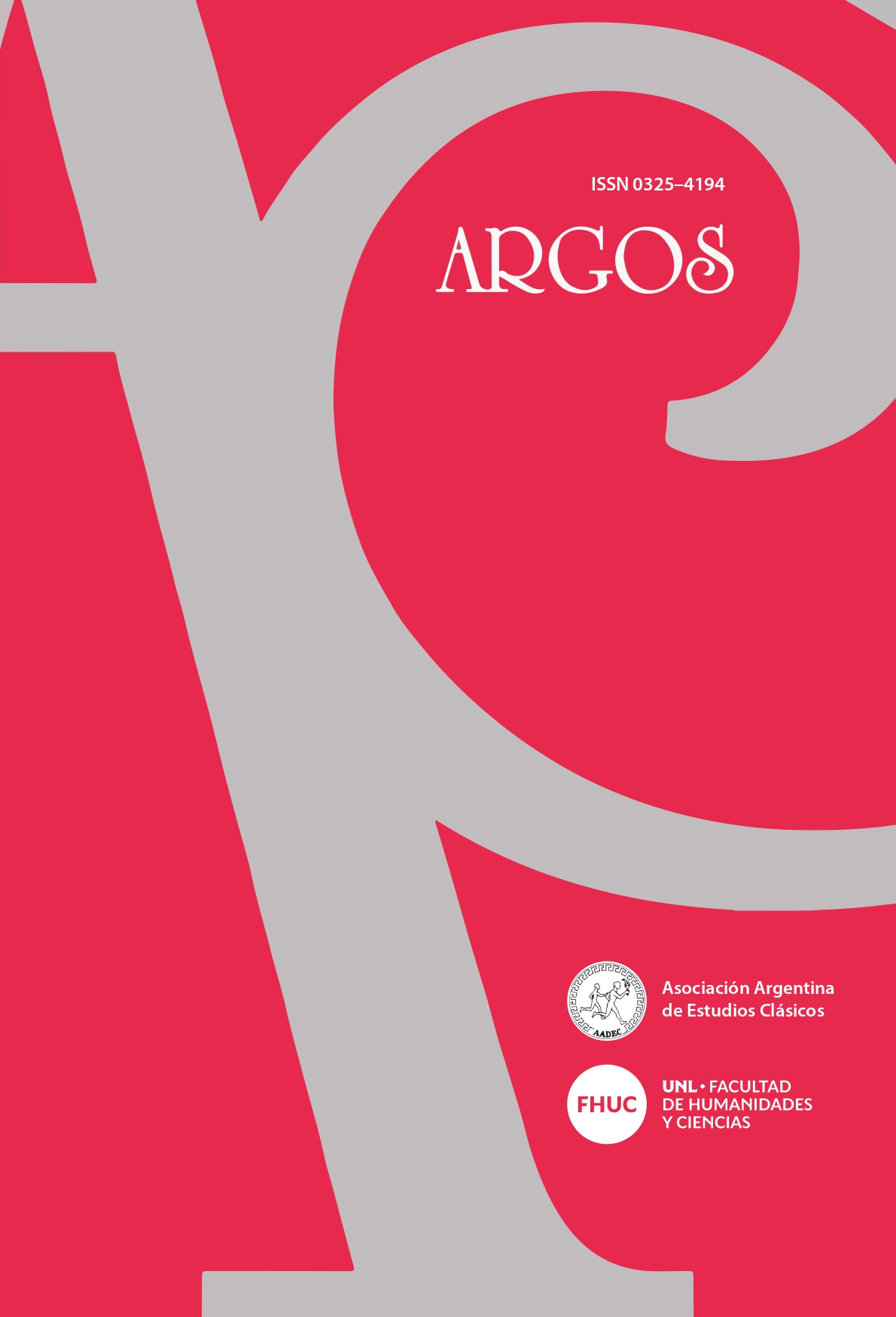El fundamento teórico de la idea de riqueza genuina en Política A de Aristóteles
DOI:
https://doi.org/10.14409/argos.2022.48.e0045Resumo
En el célebre libro inicial de la Política Aristóteles aborda diferentes temas entre los que se destaca el estudio de la economía y la crematística (Pol. A 8-11). Un elemento clave de su argumento consiste en distinguir en primer lugar entre las dos disciplinas y, a continuación, entre dos tipos diversos de crematística (crematística1 y crematística2). El eje sobre el que se asienta su argumento para discriminar entre ellas consiste en señalar que la crematística1 persigue la riqueza genuina (o verdadera, ἀληθινὸς πλοῦτος, Pol. A 8, 1256b30-1), mientras que la crematística2 va más allá de los límites razonables al no tener un fin delimitado en la persecución de los bienes materiales. Nuestra investigación pretende mostrar que la justificación última de la riqueza verdadera se encuentra en la definición de ciudad que fue desarrollada en los capítulos iniciales (Pol. A 1-2). De este modo, pretendemos defender como hipótesis general que Aristóteles utiliza las definiciones propuestas en los tramos iniciales del libro como auténticos principios explicativos y, así, que todo el argumento se encuentra orquestado de acuerdo con dichas asunciones.
Referências
Berrón, M. (2020). Aristotle’s Politics I and the Method of Analytics. Rhizomata Vol. VII.1, 83-106.
Besso, G.; Curnis, M. (2011). Aristotele. La politica. Libro I. Roma, L’ Erma di Bretschneider.
Charles, D. (2000). Aristotle on Meaning and Essence, New York.
Detel, W. (1997). Why all animals have a stomach: Demonstration and Axiomatization in Aristotle’s Parts of Animals. En Kullmann, W; Föllinger, S. (Hrsg.) (1997). Aristotelische Biologie, Intentionen, Methoden, Ergebnisse. Stuttgart, Verlag, pp. 63-84.
Fermani, A. (2016). La χρηματιστική nella Politica di Aristotele: articolazioni concettuali e ricadute etico-antropologiche”. ΠΗΓΗ / FONSI, 34-56.
García Valdés, M. (trad.) (1988). Aristóteles: Política. Madrid, Gredos.
Gotthelf, A.; Lennox, J. G. (eds.) (1987). Philosophical Issues in Aristotle’s Biology. Cambridge.
Gullino, S. (2018). Il dialogo aristotelico Περὶ πλούτου e la ‘filosofia pratica’ di Aristotele. En Grecchi, L. (a cura di) (2018). Teoria e prassi in Aristotele. Pistorio, Petite plaisance, pp. 253-276.
Karbowski, J. (2013). Aristotle’s Inquire into Natural Slavery. Journal of the History of Philosophy, Vol. 51, N° 3, 331-353.
Karbowski, J. (2019). Aristotle’s Method in Ethics. Cambridge University Press.
Kullmann, W.; Föllinger, S. (Hrsg.) (1997). Aristotelische Biologie, Intentionen, Methoden, Ergebnisse. Stuttgart, Verlag.
Livov, G. (trad.) (2015). Aristóteles. Política. Bernal, Universidad Nacional de Quilmes / Buenos Aires, Prometeo.
Livov, G. (2016). Aristóteles y la definición científica de la ciudad – estado. INTUS-LEGERE Filosofía. Vol 10. N° 1, 11-35.
Natali, C. (1991). Aristote et la chrématistique. En Patzig, G. (comp.) (1990). Aristoteles’ „Politik“, Akten des XI. Symposium Aristotelicum. Friedrichshafen/Bodensee. Göttingen: Vandenhoeck & Ruprecht
Natali, C. (2017). Il metodo e il trattato. Saggio sull’ Etica Nicomachea. Roma, Edizione di Storia e Letteratura.
Pallí Bonet, J. (trad.) (1998). Aristóteles: Ética Nicomáquea. Ética Eudemia. Madrid, Gredos.
Rapp, Ch. (2020). Definitions in Aristotle’s Politics: State and constitutions. Revue de Philosophie Ancienne, Issue 2, 367-409.
Ross, D. (ed.) (1957). Aristotelis Politica. Oxford, Clarendon Press.
Saunders, T. J. (trad.) (1995). Aristotle: Politics. Books I and II. Oxford Clarendon Press.
Zanatta, M. (2021). I principi dello statuto epistemologico della politica architettonica in Aristotele. En G. Angelini, G.; Grecchi, L., Etiche e Politica in Aristotele. Pistorio, Ed. Petite Plaisance, pp. 87-115.
Downloads
Publicado
Como Citar
Edição
Seção
Licença
Copyright (c) 2024 Argos

Este trabalho está licenciado sob uma licença Creative Commons Attribution-NonCommercial-ShareAlike 4.0 International License.



